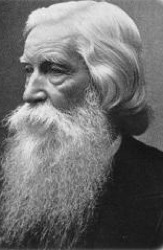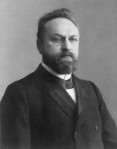
1797-1898. Principal of Princeton Theological Seminary from 1851-1878.
It is a New Life
5. While denying that regeneration is a change either in the essence or acts of the soul, evangelical Christians declare it to be, in the language of Scripture, “a quickening,” a ζωοποιει̂ν, a communication of a new principle of life. It is hard, perhaps impossible, to define what life is. Yet every man is familiar with its manifestations. He sees and knows the difference between death and life, between a dead and living plant or animal. And, therefore, when the Bible tells us that in regeneration God imparts a new form of life to the soul, the language is as intelligible as human language can be in relation to such a subject. We know that when a man is dead as to the body he neither sees, feels, nor acts. The objects adapted to impress the senses of the living make no impression upon him. They awaken no corresponding feeling, and they call forth no activity. The dead are insensible and powerless. When the Scriptures declare that men are spiritually dead they do not deny to them physical, intellectual, social, or moral life. They admit that the objects of sense, the truths of reason, our social relations and moral obligations, are more or less adequately apprehended; these do not fail to awaken feeling and to excite to action. But there is a higher class of objects than these, what the Bible calls “The things of God,” “The things of the Spirit,” “The things pertaining to salvation.” These things, although intellectually apprehended as presented to our cognitive faculties, are not spiritually discerned by the unrenewed man. A beautiful object in nature or art may be duly apprehended as an object of vision by an uncultivated man, who has no perception of its esthetic excellence, and no corresponding feeling of delight in its contemplation. So it is with the unrenewed man. He may have an intellectual knowledge of the facts and doctrines of the Bible, but no spiritual discernment of their excellence, and no delight in them. The same Christ, as portrayed in the Scriptures, is to one man without form or comeliness that we should desire Him; to another He is the chief among ten thousand and the one altogether lovely; “God manifest in the flesh,” whom it is impossible not to adore, love, and obey.
This new life, therefore, manifests itself in new views of God, of Christ, of sin, of holiness, of the world, of the gospel, and of the life to come; in short, of all those truths which God has revealed as necessary to salvation. This spiritual illumination is so important and so necessary and such an immediate effect of regeneration, that spiritual knowledge is not only represented in the Bible as the end of regeneration (Col. 3:10; 1 Tim. 2:4), but the whole of conversion (which is the effect of regeneration) is summed up in knowledge. Paul describes his conversion as consisting in Christ’s being revealed to Him (Gal. 1:16); and the Scriptures make all religion, and even eternal life, to be a form of knowledge. Paul renounced everything for the excellency of the knowledge of Christ (Philippians. 3:8), and our Lord says that the knowledge of Himself and of the Father is eternal life. (John 17:3). The whole process of salvation is described as a translation from the kingdom of darkness into the kingdom of light. There is no wonder, therefore, that the ancients called regeneration a φωτισμός, an illumination. If a man born blind were suddenly restored to sight, such a flood of knowledge and delight would How in upon him, through the organ of vision, that he might well think that all living consisted in seeing. So the New Testament writers represent the change consequent on regeneration, the opening the eyes on the certainty, glory, and excellence of divine things, and especially of the revelation of God in the person of his Son, as comprehending almost everything which pertains to spiritual life. Inseparably connected with this knowledge and included in it, is faith, in all the forms and exercises in which spiritual truths are its objects. Delight in the things thus revealed is the necessary consequence of spiritual illumination; and with delight come satisfaction and peace, elevation above the world, or spiritual mindedness, and such a sense of the importance of the things not seen and eternal, that all the energies of the renewed soul are (or, it is acknowledged, they should be) devoted to securing them for ourselves and others.
This is one of the forms in which the Bible sets forth the doctrine of regeneration. It is raising the soul dead in sin to spiritual life. And this spiritual life unfolds or manifests itself just as any other form of life, in all the exercises appropriate to its nature.
~Charles Hodge~
Systematic Theology, vol. 3 (Oak Harbor, WA: Logos Research Systems, Inc., 1997), 144–145. Free PDF | $2.99 Kindle Version
Books by Charles Hodge
The Works of Charles Hodge on Logos Bible Software
Kindle Books
More Quotes by Hodge at The Old Guys
Tags: Charles Hodge, Hodge's Systematic Theology














Matthew Henry – I Shall Behold Your Face
9 AprHe pleads his own dependence upon God as his portion and happiness. “They have their portion in this life, but as for me (v. 15) I am none of them, I have but little of the world. Nec habeo, nec careo, nec curo—I neither have, nor need, nor care for it. It is the vision and fruition of God that I place my happiness in; that is it I hope for, and comfort myself with the hopes of, and thereby distinguish myself from those who have their portion in this life.” Beholding God’s face with satisfaction may be considered, (1.) As our duty and comfort in this world. We must in righteousness (clothed with Christ’s righteousness, having a good heart and a good life) by faith behold God’s face and set him always before us, must entertain ourselves from day to day with the contemplation of the beauty of the Lord; and, when we awake every morning, we must be satisfied with his likeness set before us in his word, and with his likeness stamped upon us by his renewing grace. Our experience of God’s favour to us, and our conformity to him, should yield us more satisfaction than those have whose belly is filled with the delights of sense. 2. As our recompence and happiness in the other world. With the prospect of that he concluded the foregoing psalm, and so this. That happiness is prepared and designed only for the righteous that are justified and sanctified. They shall be put in possession of it when they awake, when the soul awakes, at death, out of its slumber in the body, and when the body awakes, at the resurrection, out of its slumber in the grave. That blessedness will consist in three things:—[1.] The immediate vision of God and his glory: I shall behold thy face, not, as in this world, through a glass darkly. The knowledge of God will there be perfected and the enlarged intellect filled with it. [2.] The participation of his likeness. Our holiness will there be perfect. This results from the former (1 Jn. 3:2): When he shall appear we shall be like him, for we shall see him as he is. [3.] A complete and full satisfaction resulting from all this: I shall be satisfied, abundantly satisfied with it. There is no satisfaction for a soul but in God, and in his face and likeness, his good-will towards us and his good work in us; and even that satisfaction will not be perfect till we come to heaven.
~Matthew Henry~
Matthew Henry’s Commentary on the Whole Bible: Complete and Unabridged in One Volume (Peabody: Hendrickson, 1994), 765.
Books by Matthew Henry
Kindle Books
Other Matthew Henry Quotes at The Old Guys
Tags: Matthew Henry, Matthew Henry's Commentary on the Whole Bible